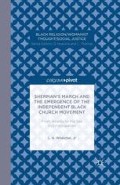Abstract
This chapter gives a description of Sherman’s march through Georgia, including the burning of Atlanta before heading to Savannah. It details how the strategy of destroying economic resources and infrastructure along the way directly led to the release of the enslaved from plantations with thousands following the Union soldiers along the way to Savannah. Vignettes of several churches affected by the campaign and the activities of their members are presented. This chapter establishes how the military campaign directly affected the development of particular churches.
Access this chapter
Tax calculation will be finalised at checkout
Purchases are for personal use only
Preview
Unable to display preview. Download preview PDF.
Notes
Gayraud S. Wilmore, Black Religion and Black Radicalism (Markyknoll, New York: Orbis Books) 1983, 116
W. J. Cash, The Mind of the South (New York: Vintage Books) 1991, 49–50.
William T. Sherman, Memoirs of General William T. Sherman (Bloomington: Indiana University Press) 1957, 66.
Gregory D. Coleman, We’re Heavenbound!: Portrait of a Black Sacred Drama (Athens, Georgia: The University of Georgia Press) 1992, 23.
Herman’ skip’ Mason, Jr., Images of African Americans: Life in DeKalb County 1823–1970 (Arcadia Publishing: Charleston, S.C.) 1998, 114.
Sara Lois Gray, Baptist Heritage, Bethlehem Baptist Church of Christ, 1823, First Baptist Church, 1973, Covington, Newton County, Georgia, 24. The White Bethlehem Baptist Church later changed its name to the First Baptist Church. After the White members of Bethlehem Baptist erected their beautiful new church, they gave their older wooden structure to the Black church. Reverend Baker served the church with distinction for 46 years. Following the pastorate of Rev. Baker, the Reverend A.D. Williams, the maternal grandfather of Martin Luther King, Jr., became pastor. This began a long and storied legacy of Baptist preachers in the King family. The Bethlehem Baptist Church would also be served by the Reverend Joel King, the son of the brother of Martin Luther King, Sr., from 1935–1941. I was speaking in Covington, Georgia, a few years ago and one of the mothers of the church told me of her remembrance of the boyhood of Martin Luther King, Jr. She told of how he would accompany his grandparents to Covington when they were serving that congregation. (See Andrew Billingsley, Mighty Like a River: The Black Church and Social Reform (New York: Oxford University Press) 1999, 23.
Author information
Authors and Affiliations
Copyright information
© 2014 L. H. Whelchel, Jr.
About this chapter
Cite this chapter
Whelchel, L.H. (2014). The March toward Liberation. In: Sherman’s March and the Emergence of the Independent Black Church Movement: From Atlanta to the Sea to Emancipation. Black Religion/Womanist Thought/Social Justice. Palgrave Pivot, New York. https://doi.org/10.1057/9781137405180_5
Download citation
DOI: https://doi.org/10.1057/9781137405180_5
Publisher Name: Palgrave Pivot, New York
Print ISBN: 978-1-349-48765-3
Online ISBN: 978-1-137-40518-0
eBook Packages: Palgrave Religion & Philosophy CollectionPhilosophy and Religion (R0)

